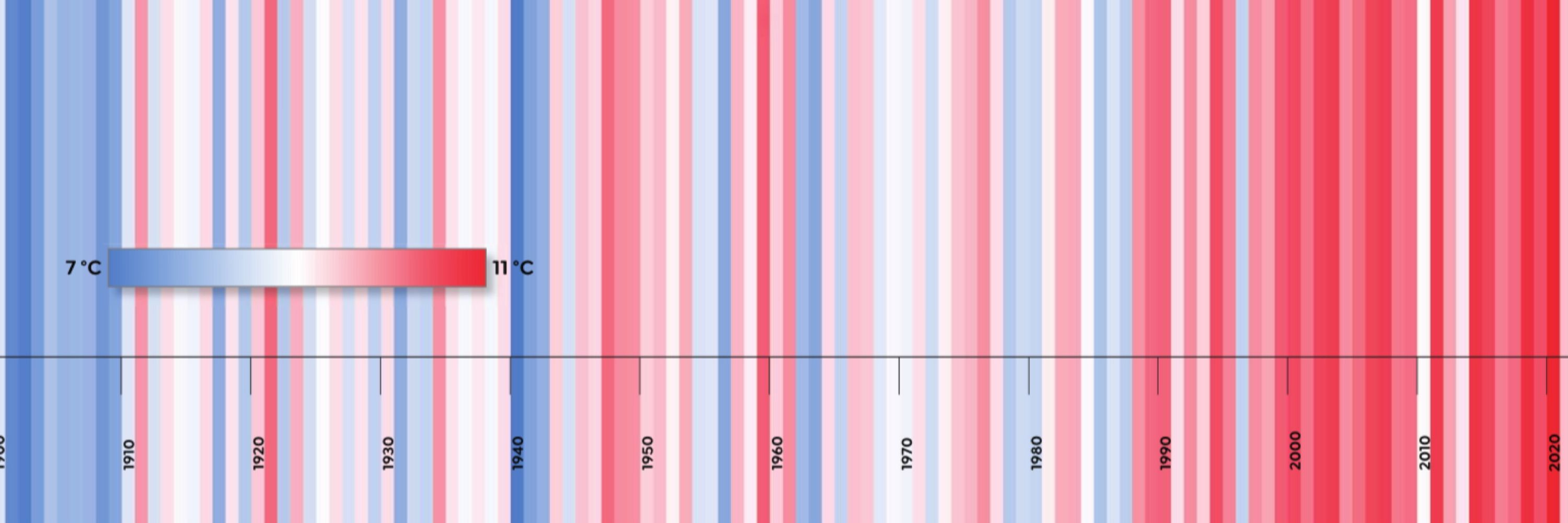
Andrew Ferrone
@ferroneandrew.bsky.social
PhD, Director of European and International Affairs, Ministry of the Environment, Climate
and Biodiversity, IPCC head of delegation
and Biodiversity, IPCC head of delegation
Today @copernicusecmwf.bsky.social and @wmo-global.bsky.social launch the European state of the climate Report 2024 👇
Thank you to the amazing editorial team and all those who contributed!
Thank you to the amazing editorial team and all those who contributed!
The #ESOTC2024 report is out! Explore the contrasts across Europe, from the dry and often record-warm conditions in the east to warm but wet conditions in the west. #ESOTC2024 is a joint effort between #CopernicusClimate and @wmo-global.bsky.social, together with over 100 scientists. bit.ly/3G9MdEX
April 15, 2025 at 7:06 AM
Today @copernicusecmwf.bsky.social and @wmo-global.bsky.social launch the European state of the climate Report 2024 👇
Thank you to the amazing editorial team and all those who contributed!
Thank you to the amazing editorial team and all those who contributed!
Looking forward to the release of the 2024 European State of the Climate next week on 15th April.
You can have a glimpse on the amazing cover art already below.
@copernicusecmwf.bsky.social @wmo-global.bsky.social
You can have a glimpse on the amazing cover art already below.
@copernicusecmwf.bsky.social @wmo-global.bsky.social
April 9, 2025 at 6:09 PM
Looking forward to the release of the 2024 European State of the Climate next week on 15th April.
You can have a glimpse on the amazing cover art already below.
@copernicusecmwf.bsky.social @wmo-global.bsky.social
You can have a glimpse on the amazing cover art already below.
@copernicusecmwf.bsky.social @wmo-global.bsky.social
I was invited today together with Magali Paulus and René Winkin by Fanny Kinsch to the RTL Lëtzebuerg show « Background am Gespréich » to talk about #ClimateChange #ClimateAction and #Solutions
You can rewatch our discussion in Luxembourgish here:
www.rtl.lu/radio/backgr...
You can rewatch our discussion in Luxembourgish here:
www.rtl.lu/radio/backgr...
www.rtl.lu
January 25, 2025 at 5:48 PM
I was invited today together with Magali Paulus and René Winkin by Fanny Kinsch to the RTL Lëtzebuerg show « Background am Gespréich » to talk about #ClimateChange #ClimateAction and #Solutions
You can rewatch our discussion in Luxembourgish here:
www.rtl.lu/radio/backgr...
You can rewatch our discussion in Luxembourgish here:
www.rtl.lu/radio/backgr...
Excellent review in @thelancet.bsky.social on the state of the scientific literature on subject on post-growth and the relationship between human wellbeing, economic growth and planetary boundaries.
www.thelancet.com/journals/lan...
www.thelancet.com/journals/lan...

Post-growth: the science of wellbeing within planetary boundaries
There are increasing concerns that continued economic growth in high-income countries
might not be environmentally sustainable, socially beneficial, or economically achievable.
In this Review, we expl...
www.thelancet.com
January 24, 2025 at 7:25 AM
Excellent review in @thelancet.bsky.social on the state of the scientific literature on subject on post-growth and the relationship between human wellbeing, economic growth and planetary boundaries.
www.thelancet.com/journals/lan...
www.thelancet.com/journals/lan...
Interested in nature-based carbon capture or industrial CCUS? Register for this conference taking place on 5 February in Belval.
www.uni.lu/en/events/th...
www.uni.lu/en/events/th...

The potential of carbon capture, utilisation and storage (CCUS) in Luxembourg
Carbon management involves reducing emissions and using a set of nature- or technology-based solutions to capture, store, transport and use atmospheric
www.uni.lu
January 24, 2025 at 7:18 AM
Interested in nature-based carbon capture or industrial CCUS? Register for this conference taking place on 5 February in Belval.
www.uni.lu/en/events/th...
www.uni.lu/en/events/th...
Reposted by Andrew Ferrone
New post on The Climate Brink from Zeke @hausfath.bsky.social about our climate future. With current policies, we’re on track for a bit less than 3C, with 2030 NDCs we’re on track for about 2.5C, and with net zero pledges we’re on track for a bit less than 2C.
www.theclimatebrink.com/p/moving-awa...
www.theclimatebrink.com/p/moving-awa...
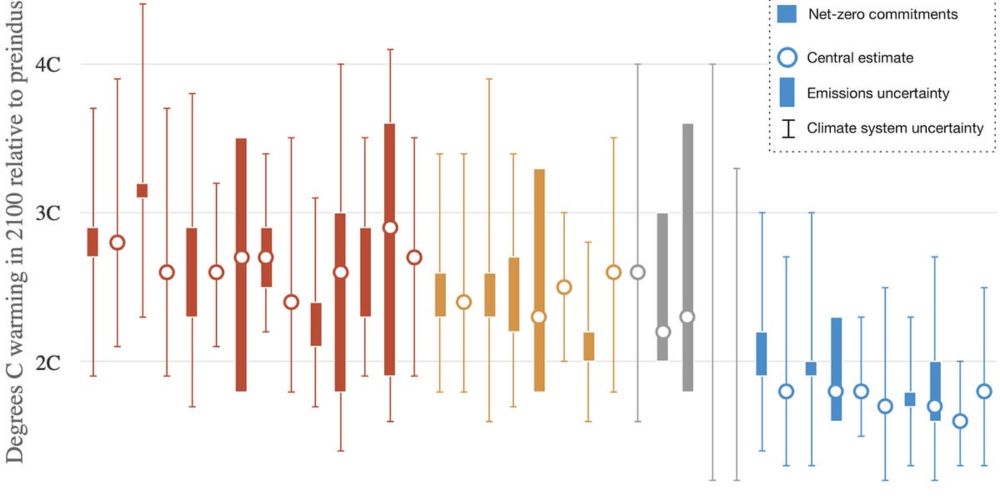
Moving away from high-end emissions scenarios
I have a new commentary in Dialogues on Climate Change exploring climate outcomes in current policy scenarios
www.theclimatebrink.com
January 15, 2025 at 6:43 PM
New post on The Climate Brink from Zeke @hausfath.bsky.social about our climate future. With current policies, we’re on track for a bit less than 3C, with 2030 NDCs we’re on track for about 2.5C, and with net zero pledges we’re on track for a bit less than 2C.
www.theclimatebrink.com/p/moving-awa...
www.theclimatebrink.com/p/moving-awa...
Reposted by Andrew Ferrone
2024 war global das heißeste Jahr seit Beginn der Aufzeichnungen, mit 1,6 Grad über dem Temperaturniveau des späten 19. Jahrhunderts. Kleiner Thread mit Datengrafiken dazu. 🧵

January 12, 2025 at 3:23 PM
2024 war global das heißeste Jahr seit Beginn der Aufzeichnungen, mit 1,6 Grad über dem Temperaturniveau des späten 19. Jahrhunderts. Kleiner Thread mit Datengrafiken dazu. 🧵
Reposted by Andrew Ferrone
From aming all the great charts that came out on Jan10 on 2024's climate, I like this one among the most. It shows nicely how the past two years have stood out not only from.the warming trend, but even from the extreme outliers from the warming trend.
2023-2024 were extreme among the extremes.
2023-2024 were extreme among the extremes.

January 12, 2025 at 6:18 AM
From aming all the great charts that came out on Jan10 on 2024's climate, I like this one among the most. It shows nicely how the past two years have stood out not only from.the warming trend, but even from the extreme outliers from the warming trend.
2023-2024 were extreme among the extremes.
2023-2024 were extreme among the extremes.
Reposted by Andrew Ferrone
For all those scientists out there working on topics related to climate change mitigation and the Paris Agreement, now is the time to submit your great research abstracts to our EGU session.
Deadline 15 January!
Details below 👇
Deadline 15 January!
Details below 👇
It's January, which means the EGU abstract Submission deadline is fast approaching: Jan 15th!
So if you're in the net-zero world please take a look at: Towards net zero and beyond: remaining carbon budgets, negative emissions, mitigation pathways and implications for policy
So if you're in the net-zero world please take a look at: Towards net zero and beyond: remaining carbon budgets, negative emissions, mitigation pathways and implications for policy
January 10, 2025 at 3:16 PM
For all those scientists out there working on topics related to climate change mitigation and the Paris Agreement, now is the time to submit your great research abstracts to our EGU session.
Deadline 15 January!
Details below 👇
Deadline 15 January!
Details below 👇
Reposted by Andrew Ferrone
"every fraction of a degree matters" is true as hell. In the same way that releasing CO2 hurts people and planet, avoiding its release saves us from potential harm
This isn't some saccharine 'hopeful' message: it's the hard, inarguable physical reality.
www.ipcc.ch/report/ar6/w...
This isn't some saccharine 'hopeful' message: it's the hard, inarguable physical reality.
www.ipcc.ch/report/ar6/w...
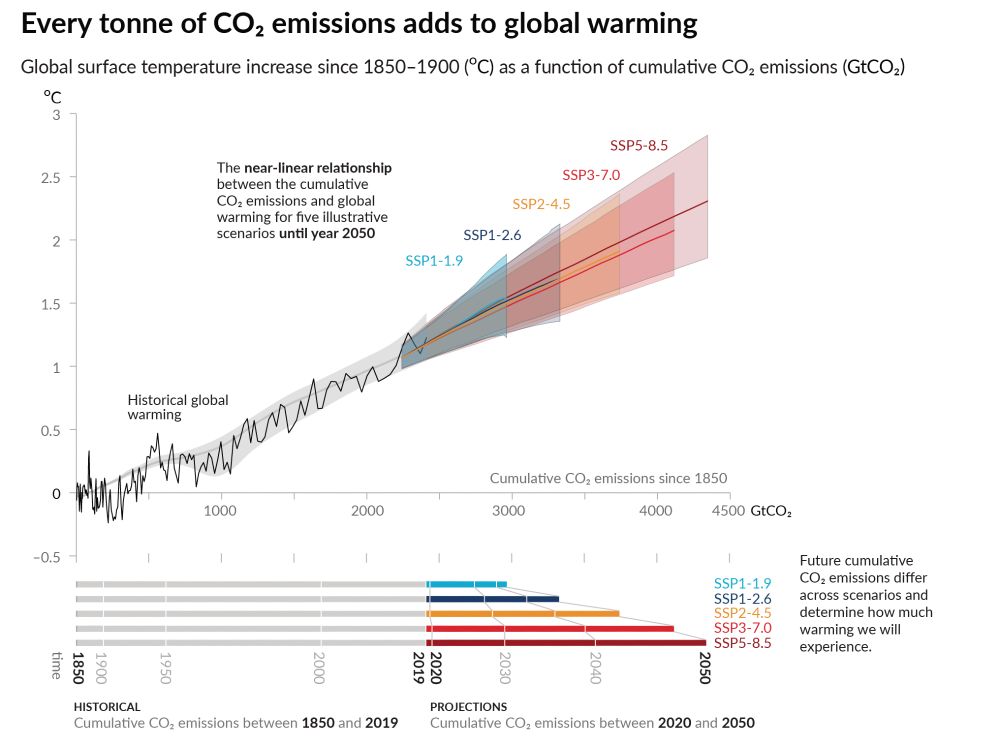
November 17, 2024 at 8:57 AM
"every fraction of a degree matters" is true as hell. In the same way that releasing CO2 hurts people and planet, avoiding its release saves us from potential harm
This isn't some saccharine 'hopeful' message: it's the hard, inarguable physical reality.
www.ipcc.ch/report/ar6/w...
This isn't some saccharine 'hopeful' message: it's the hard, inarguable physical reality.
www.ipcc.ch/report/ar6/w...
Reposted by Andrew Ferrone
I have a new analysis over at The Climate Brink exploring how rates of warming have changed over the past century.
Post-1970, GHGs (CO2, CH4, etc.) would have led to just under 0.2C per decade, but falling aerosols (SO2) have increased that rate to 0.25C. www.theclimatebrink....
Post-1970, GHGs (CO2, CH4, etc.) would have led to just under 0.2C per decade, but falling aerosols (SO2) have increased that rate to 0.25C. www.theclimatebrink....
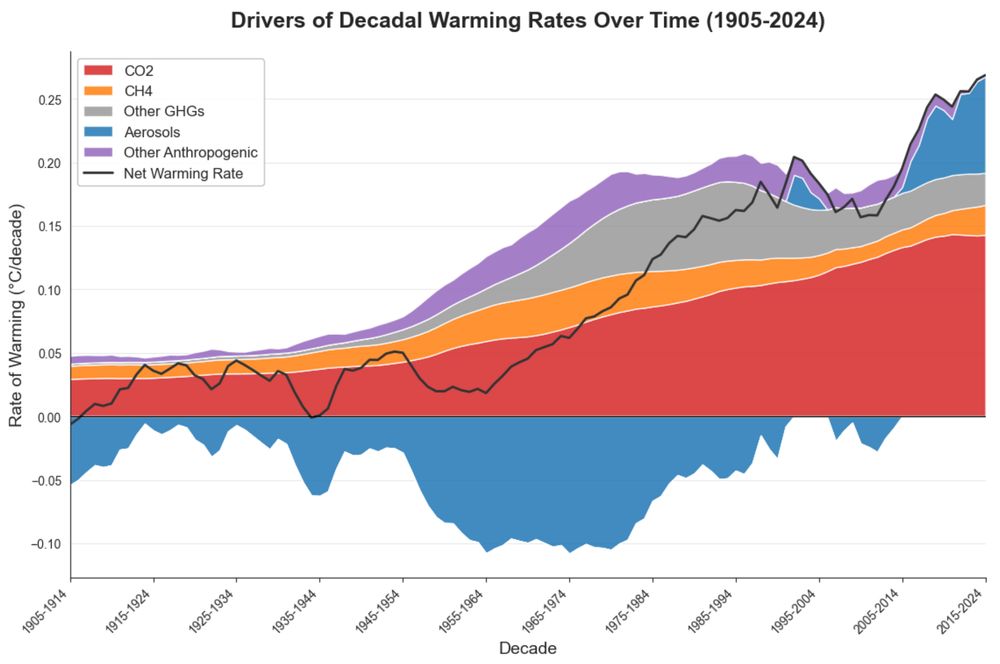
January 6, 2025 at 4:29 PM
I have a new analysis over at The Climate Brink exploring how rates of warming have changed over the past century.
Post-1970, GHGs (CO2, CH4, etc.) would have led to just under 0.2C per decade, but falling aerosols (SO2) have increased that rate to 0.25C. www.theclimatebrink....
Post-1970, GHGs (CO2, CH4, etc.) would have led to just under 0.2C per decade, but falling aerosols (SO2) have increased that rate to 0.25C. www.theclimatebrink....
Reposted by Andrew Ferrone
With all the news about the latest data showing that temperatures in 2024 were 1.6°C warmer than pre-industrial levels, many have asked what this means for the 1.5°C of the UN Paris Agreement.
A short 🧵that aims to distinguish the signal from the noise (1)
A short 🧵that aims to distinguish the signal from the noise (1)
January 10, 2025 at 3:09 PM
With all the news about the latest data showing that temperatures in 2024 were 1.6°C warmer than pre-industrial levels, many have asked what this means for the 1.5°C of the UN Paris Agreement.
A short 🧵that aims to distinguish the signal from the noise (1)
A short 🧵that aims to distinguish the signal from the noise (1)
Reposted by Andrew Ferrone
The data is in. 2024 was the warmest year on record, and probably in the whole of human history – about 1.6°C warmer than the pre-industrial period.
More than 1 billion individual thermometer measurements, made by thousands of people over many decades, have been condensed into a single number.
More than 1 billion individual thermometer measurements, made by thousands of people over many decades, have been condensed into a single number.

January 10, 2025 at 9:36 AM
The data is in. 2024 was the warmest year on record, and probably in the whole of human history – about 1.6°C warmer than the pre-industrial period.
More than 1 billion individual thermometer measurements, made by thousands of people over many decades, have been condensed into a single number.
More than 1 billion individual thermometer measurements, made by thousands of people over many decades, have been condensed into a single number.
Reposted by Andrew Ferrone
Looking ahead to 2025, we expect it to be slightly cooler than 2023 and 2024 at around 1.4C above preindustrial levels, as El Nino has faded away and cooler conditions are developing in the tropical Pacific.

January 10, 2025 at 9:00 PM
Looking ahead to 2025, we expect it to be slightly cooler than 2023 and 2024 at around 1.4C above preindustrial levels, as El Nino has faded away and cooler conditions are developing in the tropical Pacific.
This is the first time in human history that annual global temperatures have exceeded 1.5°C above pre-industrial levels - a stark reminder that our window for decisive #ClimateAction is rapidly closing.
2024 was the warmest year on record with an average global temperature 1.6°C above pre-industrial level.
It's the first year to exceed 1.5°C above pre-industrial level, with every month but one since July 23 surpassing this threshold.
Full Global Climate Highlights 2024: https://bit.ly/40kQpcz
It's the first year to exceed 1.5°C above pre-industrial level, with every month but one since July 23 surpassing this threshold.
Full Global Climate Highlights 2024: https://bit.ly/40kQpcz
January 10, 2025 at 9:32 PM
This is the first time in human history that annual global temperatures have exceeded 1.5°C above pre-industrial levels - a stark reminder that our window for decisive #ClimateAction is rapidly closing.
Reposted by Andrew Ferrone
NEW: 2024 has just been confirmed as the warmest year on record, and the first to breach the 1.5C threshold.
We used a ridgeline (Joy Division inspired) chart to visualise daily temperature anomalies since 1940.
2024 clearly stands out with 100% of its days above 1.3C and 75% above 1.5C.
We used a ridgeline (Joy Division inspired) chart to visualise daily temperature anomalies since 1940.
2024 clearly stands out with 100% of its days above 1.3C and 75% above 1.5C.
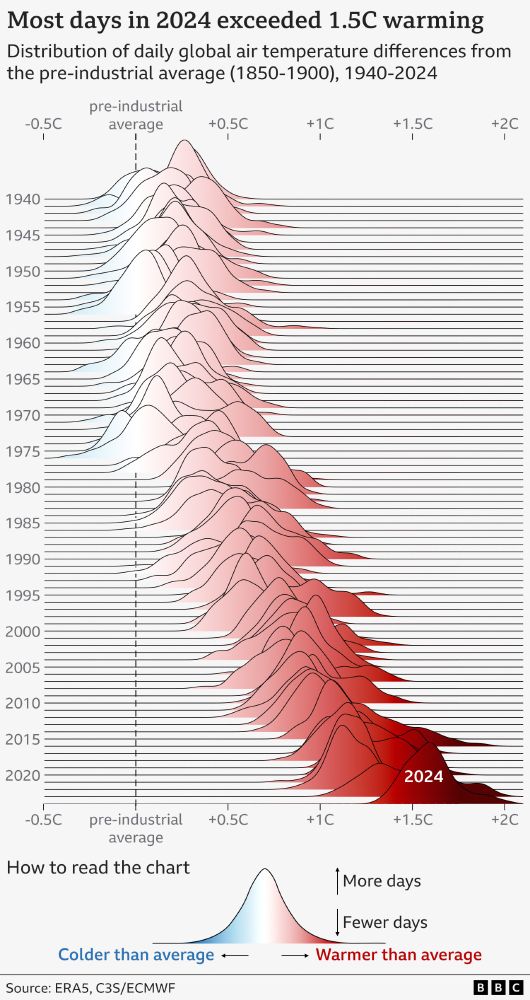
January 10, 2025 at 8:04 AM
NEW: 2024 has just been confirmed as the warmest year on record, and the first to breach the 1.5C threshold.
We used a ridgeline (Joy Division inspired) chart to visualise daily temperature anomalies since 1940.
2024 clearly stands out with 100% of its days above 1.3C and 75% above 1.5C.
We used a ridgeline (Joy Division inspired) chart to visualise daily temperature anomalies since 1940.
2024 clearly stands out with 100% of its days above 1.3C and 75% above 1.5C.
Reposted by Andrew Ferrone
The maximum number of members for the starter pack (150) has been reached. I will create a new one exclusively for journalists to free up space in this one.
go.bsky.app/Qo8jop6
go.bsky.app/Qo8jop6
January 8, 2025 at 8:48 PM
The maximum number of members for the starter pack (150) has been reached. I will create a new one exclusively for journalists to free up space in this one.
go.bsky.app/Qo8jop6
go.bsky.app/Qo8jop6
Reposted by Andrew Ferrone
Is Europe alright?

January 5, 2025 at 7:40 AM
Is Europe alright?
The Luxembourg Climate Policy Observatory (OPC) is expanding from six to nine members. If you are interested to join the work you can apply until 2 February here: opc-luxembourg.lu/en/call-for-...
Call for Candidates - opc-luxembourg
The Luxembourg Climate Policy Observatory is looking for new members to strengthen its team, which currently consists of six individuals renowned for their scientific work. Their expertise in various ...
opc-luxembourg.lu
January 6, 2025 at 12:38 PM
The Luxembourg Climate Policy Observatory (OPC) is expanding from six to nine members. If you are interested to join the work you can apply until 2 February here: opc-luxembourg.lu/en/call-for-...
#AgriMeteo have also published their #climate analysis for 2024 based on the network distributed over the whole country of #Luxembourg and they measured the highest quantity of rain since 1854 (1195.7 mm, +357.3 mm or + 42.6 % more than 1991-2020).
Details here: www.agrimeteo.lu/Internet/AM/...
Details here: www.agrimeteo.lu/Internet/AM/...
www.agrimeteo.lu
January 3, 2025 at 3:27 PM
#AgriMeteo have also published their #climate analysis for 2024 based on the network distributed over the whole country of #Luxembourg and they measured the highest quantity of rain since 1854 (1195.7 mm, +357.3 mm or + 42.6 % more than 1991-2020).
Details here: www.agrimeteo.lu/Internet/AM/...
Details here: www.agrimeteo.lu/Internet/AM/...
While @meteolux.bsky.social is not posting here, I relay the information of the climate report of the station at Luxembourg airport (anomalies from 1991-2020 reference is parenthesis):
🌡️ 10.5 °C (+0.7°C)
☔1090.2 mm (+258.9 mm)
🌞1564.3 h (-238.6 h)
🌡️ 10.5 °C (+0.7°C)
☔1090.2 mm (+258.9 mm)
🌞1564.3 h (-238.6 h)

January 3, 2025 at 7:49 AM
While @meteolux.bsky.social is not posting here, I relay the information of the climate report of the station at Luxembourg airport (anomalies from 1991-2020 reference is parenthesis):
🌡️ 10.5 °C (+0.7°C)
☔1090.2 mm (+258.9 mm)
🌞1564.3 h (-238.6 h)
🌡️ 10.5 °C (+0.7°C)
☔1090.2 mm (+258.9 mm)
🌞1564.3 h (-238.6 h)
Reposted by Andrew Ferrone
Amazing how eating less meat is better for people, animals and planet. Processed red meat contributes to dementia AND cancer, heart disease, diabetes, air+water pollution, climate warming methane emissions and even #birdflu ALL of which translate to more overall illness and healthcare cost.
#PlanetaryHealth and #Brain and #MentalHealth
"People...who ate at least two servings per week of processed red meat (such as bacon, bologna or hot dogs) had a 14% increased risk of #dementia, compared to those who ate less... after the 43-year follow-up period."
www.nbcnews.com/health/aging...
"People...who ate at least two servings per week of processed red meat (such as bacon, bologna or hot dogs) had a 14% increased risk of #dementia, compared to those who ate less... after the 43-year follow-up period."
www.nbcnews.com/health/aging...

Eating more processed red meat is linked to an increased risk of dementia, study suggests
The research adds to a growing body of evidence showing that diets lower in fat and sugar are better for brain health.
www.nbcnews.com
December 31, 2024 at 9:01 PM
Amazing how eating less meat is better for people, animals and planet. Processed red meat contributes to dementia AND cancer, heart disease, diabetes, air+water pollution, climate warming methane emissions and even #birdflu ALL of which translate to more overall illness and healthcare cost.
Reposted by Andrew Ferrone
Discussed this morning with Annick Goerens the main findings of the European State of the climate report #ESOTC on RTL Lëtzebuerg
www.rtl.lu/radio/invite...
www.rtl.lu/radio/invite...
April 23, 2024 at 7:36 AM
Discussed this morning with Annick Goerens the main findings of the European State of the climate report #ESOTC on RTL Lëtzebuerg
www.rtl.lu/radio/invite...
www.rtl.lu/radio/invite...
On my way to #Geneva by train for tomorrow’s launch of the European State of the Climate 2023 Report (#ESOTC), prepared for the first time jointly by World Meteorological Organization and Copernicus ECMWF
wmo.int/events/meeti...
climate.copernicus.eu/esotc-2023-c...
wmo.int/events/meeti...
climate.copernicus.eu/esotc-2023-c...

April 21, 2024 at 10:41 AM
On my way to #Geneva by train for tomorrow’s launch of the European State of the Climate 2023 Report (#ESOTC), prepared for the first time jointly by World Meteorological Organization and Copernicus ECMWF
wmo.int/events/meeti...
climate.copernicus.eu/esotc-2023-c...
wmo.int/events/meeti...
climate.copernicus.eu/esotc-2023-c...


